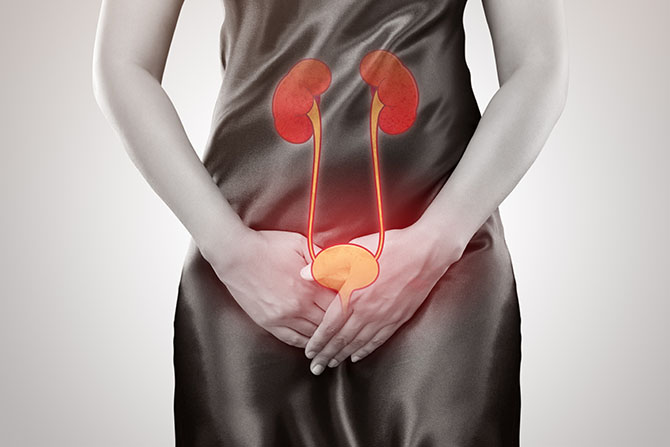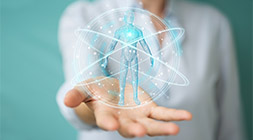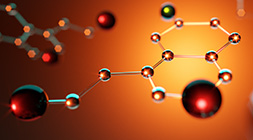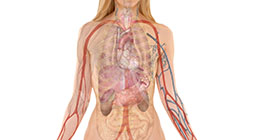
Overview
Symptoms
Causes
Prescription
Health Tips
Urinary tract infections (UTIs) refer to infections of the urethra, bladder, and kidneys that are caused by bacteria, viruses, fungi, and a variety of parasites. They occur in both men and women, but adult women experience these infections twice as often as men due to the proximity of the urethra to the vagina and anus.
Treatment must be swift as UTIs may cause permanent damage to the urinary tract, chronic infections, kidney disease, and, in men, worsen prostate problems. In men with an enlarged prostate or prostate cancer, urinary tract infections are often a result of the underlying condition.
When infection is located in the bladder it is called cystitis, and urethritis when the urethra is affected. A more serious condition, pyelonephritis or kidney infection, is most often the result of bacteria in the bladder traveling to the kidneys. Pyelonephritis may also be caused by a weakened immune system that allows infections in the blood to affect the kidneys.
Infants, children, and adolescents may also be affected with urinary tract infections; 5 percent of teenage girls will develop a UTI. Urinary tract infections are often overlooked in young children with fever.
Urine tests can determine the presence of infection in most individuals, but many, especially women, may have all the symptoms of UTIs with no bacteria present in the urine.
Interstitial Cystitis
Interstitial cystitis is a chronic inflammation of the urinary bladder lining and the bladder muscle that is not caused by bacteria. While there is no bladder autoantigen that has been identified, it often coincides with lupus and other autoimmune diseases, leading researchers to believe it may be an autoimmune disorder. The continual inflammation eventually results in a shrunken bladder that cannot hold adequate amounts of urine, causing those afflicted to plan their lives around the quick location of toilets.
It is predominantly a female affliction; only 10 percent of interstitial cystitis cases occur in men. In men it will often be undiagnosed because the symptoms are so similar to prostatic pain. Although rare, interstitial cystitis has been diagnosed in children. It is estimated that more than 1 million people in North America suffer with interstitial cystitis. The symptoms of irritable bowel syndrome may be present with interstitial cystitis, thus compounding the problem.
Symptoms
Symptoms of a UTI may include:
- Blood in the urine
- Burning pain during urination
- Children may experience urinary incontinence during an infection
- Fever and a flu-like feeling may be present
- Frequent urination
- Increased urination at night
- Lower abdominal pain
- Lower back pain during a kidney infection
- Urine may have a bad odour or be darker in colour
- Volume of urine excreted may be reduced
Symptoms of interstitial cystitis include:
- Blood in the urine
- Frequent urination, day or night; in severe cases this may happen around 60 times a day
- Need to urinate becomes urgent
- Other symptoms may be present such as migraines, joint or muscle pain, gastrointestinal problems, or allergic reactions
- Pain or spasms of the abdomen, urethra, or vagina
- Reduced bladder capacity, and the bladder wall bears scars and hemorrhaged punctures
- Reduced sex activity for both men and women because it is too painful
- Reduced sex life or the associated chronic pain may lead to depression, ranging from moderate to severe
Causes
The vast majority of UTIs are caused by bacteria such as E. coli, which are commonly found in the vagina or intestine, being spread into the urethra from the anus. Women are more susceptible to infection than men because their urethra is shorter and situated closer to the anus.
Risks that create a vulnerability to UTIs are:
- Antibiotic use
- Blockages in the urethra (due either to past infections or structural abnormalities)
- Diabetes and related conditions
- Diaphragms
- Food allergies
- Hormonal imbalances, often brought on by menopause
- Oral contraceptives
- Pregnancy and childbirth
- Sexual contact
- Stress
- Weakened immune system
The herpes virus is also a cause of UTIs because during an active outbreak, it may be so painful to urinate that the bladder is not fully emptied, thus allowing for infection.
Candida overgrowth is a source of fungal infection in the urinary tract. Parasites, including a variety of worms and protozoa, may also cause UTIs.
In men, UTIs are predominantly caused by an enlarged prostate or prostatitis. Treating the underlying condition generally eliminates the UTI.
In children, one-third of UTIs are a result of reflux—when urine flows back up the ureters from the bladder to a kidney. The kidney may become scarred if reflux is not diagnosed and there are repeat infections. Another cause is bladder instability where the bladder attempts to void urine before it is full and then later it becomes impossible to hold it in.
The cause for interstitial cystitis is unknown, although some researchers theorize that it may begin with an initial infection. However, testing for an infectious presence has been inconsistent so no conclusions may be drawn at this time. Interstitial cystitis may appear as a symptom of lupus or endometriosis, and be aggravated by the environment (i.e., diet and lifestyle). Food allergies are thought to be a major factor in initiating and promoting this disease. Fortunately, there is now an effective drug-free treatment in natural health products that contain calcium glycerophosphate.
Research is currently ongoing into a possible genetic predisposition for urinary tract infections.
Prescription for Health
A three- to fourteen-day course of antibiotics may be prescribed for the treatment of UTIs, yet some health professionals believe that natural treatments could be tried first, and only if fever and pain persist for several days should antibiotic therapy be prescribed. If possible, avoid taking antibiotics for urinary tract infections. Excessive use can lead to the creation of “supergerms” that grow increasingly resistant to antibiotic drugs. Antibiotics also destroy the beneficial bacteria in the intestines that help fight infections. For most urinary tract infections, natural treatments and methods of prevention may be enough. If experiencing kidney pain, see a physician immediately.
Diet
Avoid foods that have been noted for exacerbating symptoms such as spicy and acidic foods, acidic fruits, chocolate and artificially sweetened foods. Reduce or eliminate intake depending on the severity of symptoms.
Certain beverages irritate and aggravate the bladder making symptoms worse. For example, caffeine may cause spasms in the bladder. Because of their negative effects, these beverages should be avoided during a UTI.
- Acidic fruit juices (lemon, orange, tomato, pineapple, etc.)
- Alcohol
- Artificially sweetened drinks
- Caffeinated, sweetened sodas
- Coffee/caffeine
- Water is the cheapest medicine one can take to eliminate and prevent bladder infections. Drink an 8 oz (250 mL) glass of pure, filtered water every hour while awake during the day. Do not drink during meals as that will dilute digestive enzymes.
Drink 16 oz (500 mL) of pure, unsweetened cranberry juice daily to inhibit bacterial growth (do not buy the commercial ‘cocktail’ type found in supermarkets which are loaded with sugars). Be sure to add natural cleansers and diuretics such as celery, parsley, and watermelon to diet.
Consume lots of plain yogurt or take acidophilus supplements to boost intestinal flora, especially when taking antibiotics.
| Nutrient | Dosage | Action |
|---|---|---|
| Cranberry (34:1 extract) containing lignans and
Proanthocyanidins (PACS) |
Cranberry (34:1 extract) 500–1000 mg |
Prevents E. coli bacteria from adhering to urinary tract; protects stomach lining from H. pylori
The lignans in cranberry protect the CP450 system, preventing breast cancer |
| BB536 Bifidobacterium longum | 5–10 billion active | Improves intestinal flora to fight bacteria, organisms essential for those taking antibiotics |
| Beta 1,3/1,6 Glucans | 125 mg daily | For a strong immune system, enhances T-cells and Natural Killer cells |
| Uva Ursi tea | 1 cup daily | Uva ursi acts as a diuretic, alleviates pain and fights bacteria (*do not use if pregnant) |
| Hibiscus extract | 200 mg per day | 77 percent reduction in UTIs over 6 months. Natural bactericidal disables infectious bacteria |
Recommended for those with interstitial cystitis:
| Nutrient | Dosage | Action |
|---|---|---|
| Prelief® (calcium glycerophosphate) | 2 tablets whenever you consume acidic foods or drinks | Research has shown 70% of those with interstitial cystitis report relief from pain; 61% report a decrease in the urgency to urinate |
| Gotu Kola (Centella asiatica) | 200 mg twice daily; use standardized extract | Strengthens bladder wall, reduces the formation of scar tissue |
| Horsetail and Marshmallow tea | 1-2 cups daily | Horsetail strengthens bladder wall; marshmallow calms an irritated bladder |
Health Tips to Enhance Healing
- After swimming or water skiing, change into dry clothes immediately.
- Avoid exposure to heavy metal toxins such as aluminum and cadmium which may lead to infection.
- Castor oil packs or a hot water bottle placed on the inflamed area may help soothe spasms.
- Do not use douches, bleached toilet paper, or commercial bubble baths.
- Drink 16 oz (500 mL) of pure, unsweetened cranberry juice daily.
- Drink an 8 oz (250 mL) glass of pure, filtered water every hour one is awake during the day. Do not drink during meals as this will dilute digestive enzymes.
- Eat plain, probiotic-rich yogurt daily.
- Enhance the immune system by taking a multivitamin with minerals every day.
- Go to the bathroom every two to three hours to empty the bladder.
- Practice good daily hygiene and keep the genitals and anus clean.
- Stay warm. Sitting on cold or damp surfaces may aggravate symptoms.
- Stop smoking; research has shown it will aggravate interstitial cystitis.
- Support groups help people cope with the changes in lifestyle brought on by the illness. Check out the Interstitial Cystitis Association’s web site for more information at www.ichelp.com, or contact a personal counseling service.
- Urinate immediately after intercourse and exercising.
- Use unbleached, organic panty liners, pads and tampons instead of the bleached type commonly available.
- Wear cotton underwear to keep the area dry and increase the flow of air.
- Women on top during heterosexual intercourse may reduce the number of bacteria being pushed into the urethra.
- See Allergies, Prostatitis, Benign Prostatic Hyperplasia to understand and eliminate the underlying causes of UTIs.










